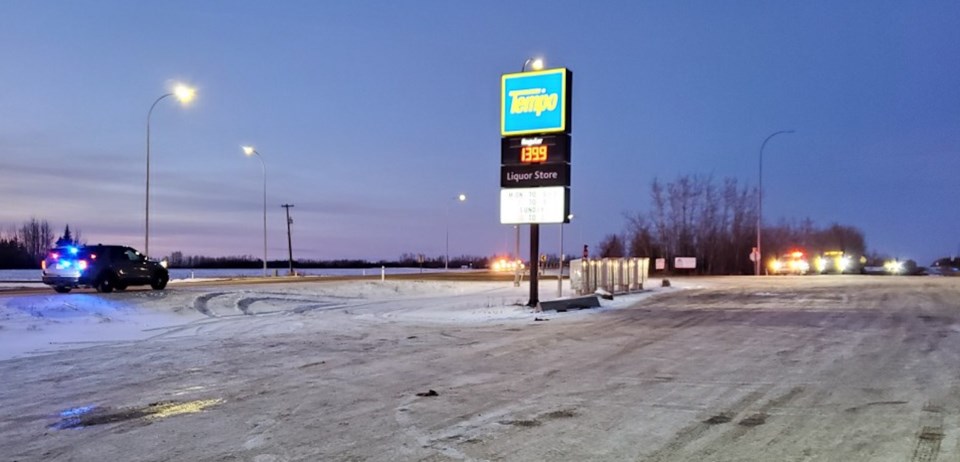WESTLOCK – With past COVID-19 gathering restrictions now well in the rear-view mirror, Christmas 2022 will be the first time in two years for many to attend Christmas and New Year’s parties with family and friends.
And while the RCMP would never discourage people from having some fun and sharing in the festive spirit, they want to remind folks that if you drink alcohol, or ingest cannabis, don’t get behind the wheel of your vehicle.
Alberta RCMP Traffic – Westlock Unit Commander Sgt. Leigh Drinkwater said Dec. 1 there are no excuses for impaired operation as it’s “absolutely preventable.” He said partygoers need to plan ahead to use a ride-share or taxi, if available, call a friend or family member or have a designated driver at their event. And if that’s not available, there’s always the couch or spare room to crash for a night — simply, don’t get behind the wheel.
According to stats provided by Drinkwater, between 2010-2019, 496 people died in collisions involving impaired drivers and 7,000 people were injured. In 2019, one in eight drivers involved in a fatal collision were legally impaired at the time of the accident, while in 2021 Alberta RCMP removed 6,787 impaired drivers from the road, which adds up to more than 18 impaired drivers a day.
On Saturday, Dec. 3, Drinkwater and his officers were out in full force across the region in support of National Impaired Driving Enforcement Day and conducted traffic enforcement initiatives and checkstops — his unit patrols the highways in and around Westlock, Barrhead, Wabasca and Slave Lake.
“Certainly, the focus has historically always been on the holiday season, but impaired driving is a problem and an issue for us all year long,” he said.
And it’s not just alcohol or cannabis, said Drinkwater, noting people need to pay close attention to their prescriptions.
“They’ll reach into their console or purse and show us their prescription and we’re looking at the label and it says, ‘If you consume, do not operate a motor vehicle or machinery.’ Yes, it’s legal to possess and it was prescribed by a doctor, but if it says you shouldn’t be taking it and driving, your ability to operate a motor vehicle is impaired,” he added.
Police can ask for a breath sample at all times
Four years after the passage of Bill C-46, which allows police to demand a breath sample from any lawfully stopped driver, Drinkwater said they still get slack from the public.
Known as Mandatory Alcohol Screening (MAS), at any time of day or night, a police officer can make a breath demand regardless of whether they believe the person has consumed alcohol or smoked a joint.
“Despite the fact it’s been years since Bill C-46 passed, we still have people asking us why they have to blow,” he said. “It doesn’t matter if it’s 6:30 in the morning or 6:30 at night. If we stop you, odds are you going to be providing a breath sample.”
As well, on Dec. 1, 2020, Alberta introduced the new Immediate Roadside Sanctions Program (IRS) that provides an array of “serious, immediate and escalating” consequences for impaired drivers ranging from a 15-month driver’s licence suspension for a first-time offence, to fines, 30-day vehicle seizures, Criminal Code charges as well as mandatory education and participation in the Ignition Interlock Program. Meanwhile, there’s zero tolerance for drivers with a Graduated Driver’s Licence, meaning that can’t have any drugs or alcohol in their system if they get behind the wheel.
Drinkwater notes they have several investigators who are trained to conduct standardized field sobriety testing and are also trained as drug recognition experts. Cannabis use, he notes, reduces many cognitive and visual skills, such as tracking, reaction time, visual function, concentration and short-term memory. According to Health Canada’s 2021 Canadian Cannabis Survey, 21 per cent of people who had used cannabis in the past 12 months reported they had driven within two hours of consumption, and 35 per cent of these respondents did so within the last 30 days.
“Driving impaired under the influence of drugs or alcohol is dangerous and illegal,” said Alberta RCMP Traffic Insp. Chris Romanchych in a release. “The greatest gift you can give this holiday season is doing your share to help ensure everyone makes it safely home this time of year.”



